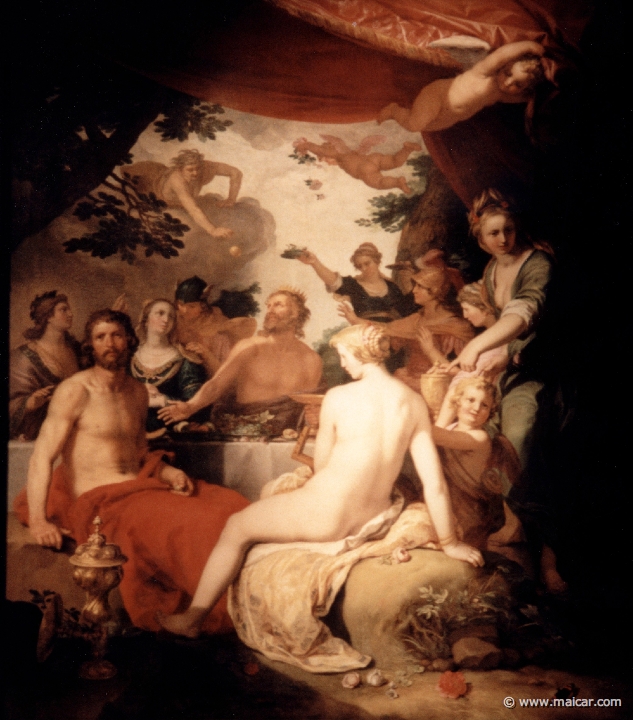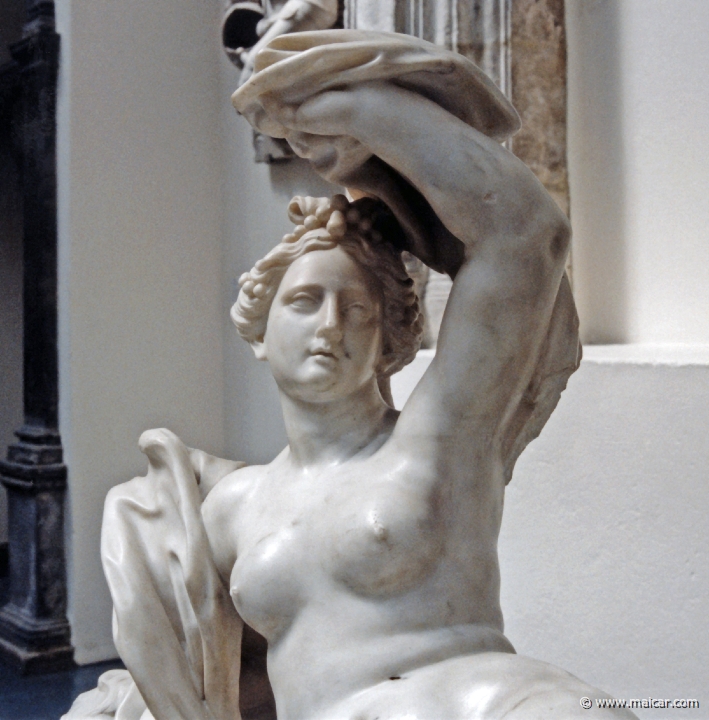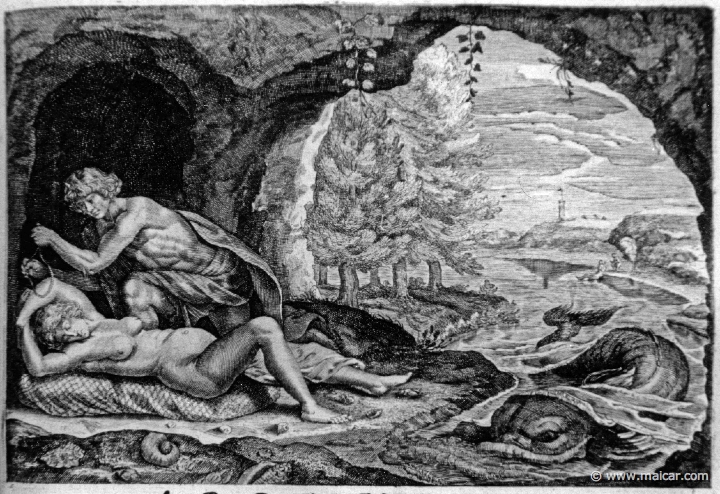|

|
The wedding of Peleus and Thetis: while the gods feast at the table Eris throws her apple from a cloud. 3905: A. Bloemaert 1564-1651: Wedding of Peleus and Thetis. Mauritshuis, Den Haag.
|
|
|
"There is no city so barbarous or so strange in its speech that it does not know the Fame of the hero Peleus …" (Pindar, Isthmian Odes 6.25).
Clytaemnestra: Did Thetis or his father train Achilles?
Agamemnon: Chiron brought him up, to prevent his learning the ways of the wicked.
Clytaemnestra: Ah! wise the teacher, still wiser the one who gave his son. (Euripides, Iphigenia in Aulis 709).
|
|
Peleus, who was driven fugitive from the island
of Aegina, became in time king in Phthia. In his
life he both plotted and was plotted against. He
was born a mortal, but having married a goddess,
his wedding party was, for several reasons, the
greatest that has ever been. However, his wife
deserted him, and his heirs died before him. Yet
Peleus, who is among the few privileged to have
heard the song of the MUSES, is now immortal and
lives with Thetis in her father's house, or else
dwells in the Islands of
the Blest.
Children of Aeacus
Once Zeus had
transformed ants into men to cure the loneliness of
King Aeacus of Aegina, this ruler married Endeis, and had by her two sons, Peleus and Telamon; others have said that Telamon was not Peleus' brother but his friend, himself being son of Actaeus 2 and Glauce 2, daughter of Cychreus, king of Salamis, an island off the coast of Attica in the Saronic Gulf not long from the island of Aegina.
Peleus banished from home
Later, however, King Aeacus consorted with the nereid Psamathe 1, despite her attempt to avoid him by turning into a seal, and had by her a son Phocus 3. It is told that this young man excelled in athletic sports, and that for this reason Peleus and Telamon plotted against him. After casting lots to decide who would kill him, Telamon was appointed and slew his half-brother in a match by throwing a quoit at his head. Others say, however, that when Telamon and Peleus had induced their half-brother to compete at the pentathlon, Peleus, who was using a stone for a quoit, hurled it intentionally at Phocus 3, hitting and killing him. Once the crime had been committed, the two conspirators carried the body and hid it in a wood, but despite their efforts to conceal their deed, the murder (which some think it was done to please their mother Endeis whereas others believe it was an accident and not a murder) was detected, and on its account both Peleus and Telamon were banished from Aegina by Aeacus. Some generations later, Pylades plotted together
with Orestes 2 against Neoptolemus, son of Achilles, son of Peleus
and Thetis. Pylades, some say, had his own reasons
while helping his friend Orestes 2; for he himself was son of Strophius 1, son of Crisus, son of Phocus 3.
Peleus marries princess
Telamon went to Salamis, whence he probably had come, while Peleus fled to Phthia to the court of Eurytion 2, and was purified by him. According to some, Eurytion 2 was son of King Actor 1 of Phthia, son of Myrmidon, but others say that he was son of Irus 1 and Demonassa 1. In any case, Eurytion 2 gave Peleus a third part of his country, and his daughter Antigone 1 as wife.
Accidentally kills his his father-in-law
This is the time when the ARGONAUTS assembled,
and Peleus joined them. On his return from this
expedition, when a boar sent by Artemis ravaged Calydon, Peleus joined
the CALYDONIAN
HUNTERS. During this hunt, Peleusstruck down, as they say undesignedly, his father-in-law Eurytion 2 with a javelin, and having for that reason being compelled to leave Phthia, he came to Iolcus where Acastus reigned, and was purified by him. Medea, who had come
to Hellas with the ARGONAUTS, had already
visited the palace at Iolcus; for King Pelias 1, father of
Acastus, was now dead through her machinations. And
in the course of the funeral games that Acastus
celebrated in honor of his father, Atalanta wrestled with
Peleus and won over him; and yet he would later
defeat a goddess through a kind of wrestling.
Plot against Peleus
Now, while Peleus was a guest at Iolcus, the king's wife Astydamia 3 fell in love with him, and as he refused her, she sent a message to Peleus' wife Antigone 1 telling her that Peleus was about to marry Acastus' daughter Sterope 5. On learning this, Antigone 1 strung herself up. In addition, Astydamia 3 told her husband that Peleus had attempted to seduce her. Acastus was reluctant to kill the man he had purified, but took him instead to hunt on Mount Pelion, not far away from Iolcus in Thessaly, and when Peleus had fallen asleep, he deserted him, hiding his sword. Having woke up unarmed, Peleus was caught by the CENTAURS, who would
have killed him, had not Chiron, who also restored
him his sword, interceded.
|

|
7825: Antonio Tarsia 1663-1739: Thetis. Marble. Victoria and Albert Museum, London.
|
|
Second marriage
Having lost his wife on account of the intrigues of Astydamia 3, Peleus married Polydora 2, daughter of Perieres 1, son of Aeolus 1 according to some, or according to others son of Cynortes, son of Amyclas 1, son of Lacedaemon, son of Zeus and the Pleiad Taygete. Polydora 2's mother was Gorgophone 2, daughter of Perseus 1 and Andromeda.
Married to a goddess
Now, whatever happened to Polydora 2, after her Peleus married the nereid Thetis. Zeus and Poseidon had been once
rivals for the hand of this goddess, but because Themis, or the MOERAE, or Proteus 2, or Prometheus 1 prophesied that the son born of Thetis would be
mightier than his father, they both withdrew.
Others say, however, that Thetis would not consort
with Zeus because she had
been brought up by Hera,
and that Zeus, wishing to
punish her, married her to a mortal, his own
grandson Peleus.
How Peleus caught her
But because Thetis could easily evade anyone
using her power to change into different forms, Proteus 2 (who also
knew this art) gave Peleus the necessary
instructions in order to conquer her saying:
"… And though she take a hundred lying forms, let her not escape you, but hold her close, whatever she may be, until she take again the form she had at first." (Proteus 2 to Peleus. Ovid, Metamorphoses 11.250).
Others have said that it was the wise Centaur Chiron who instructed
Peleus, and not Proteus 2. But whoever the teacher was, this is how
Peleus, following those instructions, lay in wait
for Thetis in the southern promontory of Magnesia,
called Sepia, and there conquered the
shape-changing goddess, who was reluctant to marry
him; for, being herself a deity, a mortal was not
the best she could get. And Thetis knew well the
reasons of her defeat, for she said:
"It is not
without some god's assistance that you
conquer." (Thetis to Peleus. Ovid, Metamorphoses 11.263).
Peleus' wedding party
Chiron gave Peleus an
ashen spear, with which Achilles later wounded
and healed Telephus,
and Poseidon gave him the immortal horses Balius 1 and Xanthus 1 that followed Achilles to
the war at Troy. And during
the wedding party, said Chiron to Thetis:
"Daughter of Nereus, you shall bear a son, a dazzling light to Thessaly…for he shall come with an army of Myrmidon spearmen to the famous land of Priam, to set it in a blaze …" (Chiron to Thetis.
Euripides, Iphigenia
in Aulis 1065).
The wedding of Peleus and Thetis was celebrated
on Mount Pelion by the gods with a great feast. In
it the MUSES themselves
sang; and this is why Peleus is counted among those
who attained the highest prosperity of all mortal
men, since he
"… heard the Muses of the golden diadems singing on the mountain …" (Pindar, Pythian Odes 3.90).
But it was also at this party that Eris threw the fatal Apple
that led to the Judgement of Paris, the abduction of Helen, and the Trojan War, in which
her beloved son Achilles, mightier than
his father, perished. Knowing what would happen,
Thetis tried to make her son immortal, but being
prevented by Peleus, she left her husband's home
forever, returning to the sea, her natural abode.
Peleus captures Iolcus
Peleus gave his child Achilles to Chiron to be educated by
him, while himself, having Jason and the DIOSCURI as allies, attacked and sacked Iolcus, capturing Queen Astydamia 3, who had plotted against him. Peleus then, in an attempt to get even, divided her limb from limb, leading his army through her into the city. And yet a poet affirmed:
"Among old examples of excellence is king Peleus … who alone, without an army, captured Iolcus …" (Pindar, Nemean Odes 3.34).
Phoenix 2 and Patroclus 1 come to Peleus' house
When Peleus' son Achilles was fifteen
years old, all events that were necessary for him
to become famous in war abroad had taken place: Eris had thrown her apple,
the three goddesses had been judged by Paris, and Helen had been abducted. Achilles was
accompanied to Troy by Patroclus 1 and by Phoenix 2. The latter, accused of having seduced his father's concubine Phthia 3, had been blinded by his own father Amyntor 1, and it was Peleus who brought him to Chiron to have his sight restored. Thereupon Peleus made Phoenix 2 king of Dolopeis, a city near Lake Xynius, whence he ruled the Dolopians living in Epirus and Thessaly. Achilles died in the war, and Phoenix 2, an old man, left this world on his homeward way from Troy;
but Achilles' son Neoptolemus, who
traveled back in his company, became king of
Epirus. Patroclus 1 came to the house of Peleus seeking refuge after
having killed Clitonymus over a game of dice, and
there he became Achilles' best friend,
or as some believe, his lover.
Peleus saves Andromache's life
|

|
Peleus and Thetis in the cave at Sepia. 2809: Peleus and Thetis; Engraving from Les Métamorphoses d'Ovide, F. Foppens, Bruxelles 1677.
|
|
When Troy had been
sacked, Neoptolemus heard that his grandfather Peleus had been expelled
by Acastus, and that is the reason why, some say,
he departed for home in haste. Peleus might have
been then restored, for it is also said that Neoptolemus refused
to accept the throne of Pharsalia while his
grandfather was still alive. Neoptolemus, who
settled in Epirus, did not succeed Peleus; for he
was murdered at Delphi by Orestes 2 on account of Hermione. This girl,
who had been promised in marriage by her father Menelaus both to Neoptolemus and Orestes 2, married
first the former. But as Neoptolemus had
brought Hector 1's wife Andromache captive
from Troy, and had a son by
her, whereas Hermione herself was childless, she plotted against Andromache while Neoptolemus was
visiting Delphi, being
helped by her father Menelaus, who had come
to Epirus. Menelaus intended to kill Andromache, for he
believed that this woman was taking his daughter's
place. But when he was about to commit this crime,
Peleus arrived with troops to his grandson's house,
and saved Andromache's life.
Desolation
His grandson's death, however, left him
desolated:
"Life is gone
and hope dead. Not one of my family is left, not
one to bear my name." (Peleus. Euripides, Andromache 1175).
Immortality
But then Thetis, who had deserted him long ago,
returned in remembrance of their marriage, and
after instructing him to bury Neoptolemus at Delphi, she announced
that she had come to grant him immortality, saying
that thence forward they should live together till
time ends in her father's house:
"… Go to the ancient Sepian Rock and sit down in its vaulted cave, and wait until I come out of the sea with fifty dancing nymphs to escort you home. Cease from your grieving for the dead. For this is the judgement that stands over all mortals and death is their debt to pay. " (Thetis to Peleus. Euripides, Andromache 1265).
|